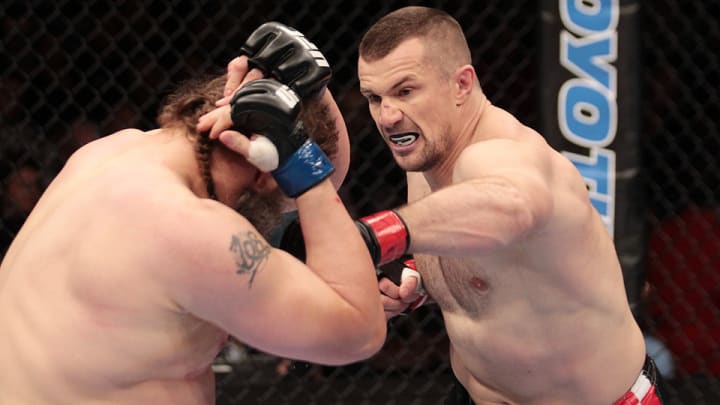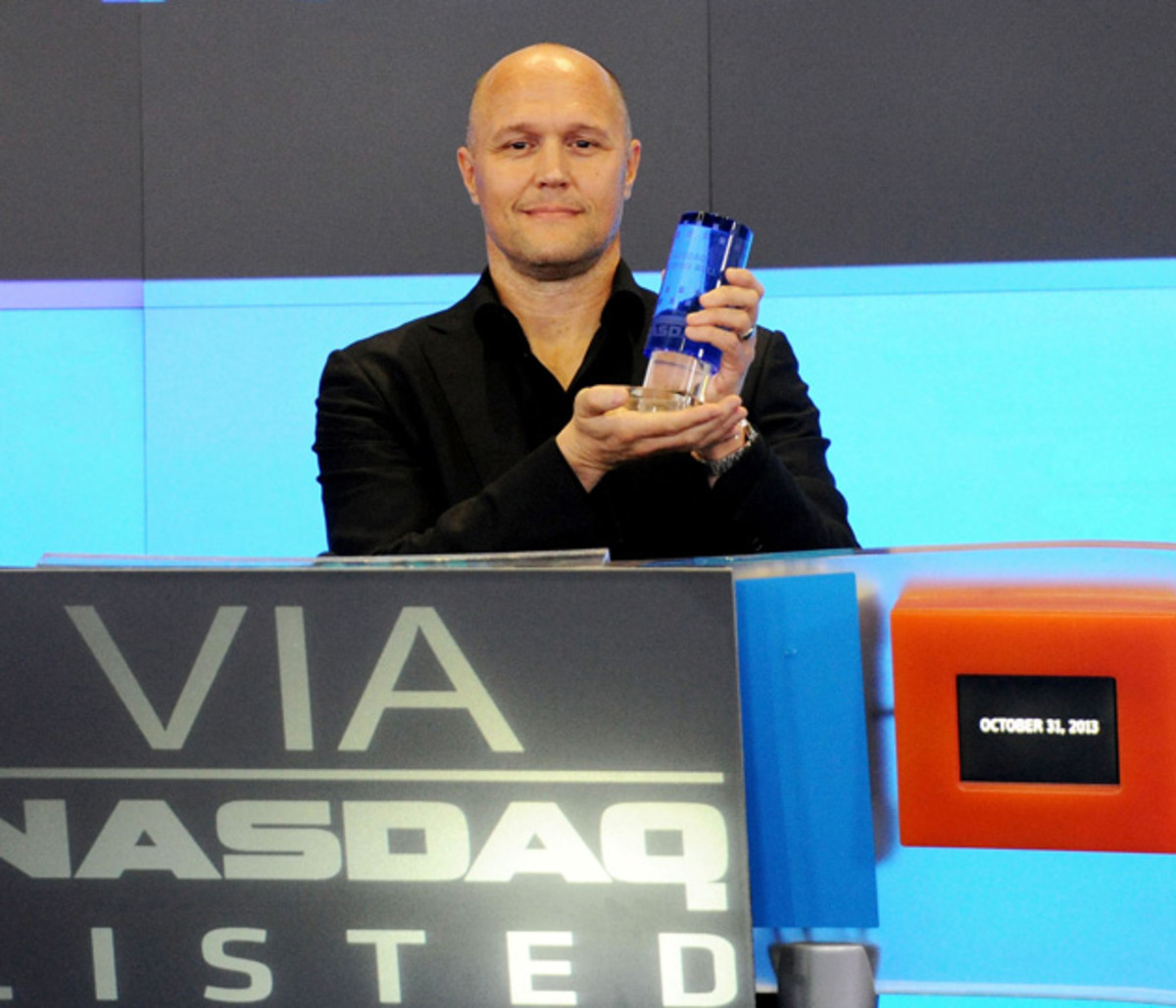Bellator ousts Bjorn Rebney on eve of Glory pay-per-view event

Bellator MMA has been rescued. Saved from its forebearer. Saved from itself. Saved from the scorn of the cage-captivated masses.
That's a melodramatic characterization of the change of leadership on Wednesday, but the fight promotion is owned by media giant Viacom, which runs nearly 200 television outlets and makes it its business to steer story lines and draw in audiences. This week's episode might not bring the second-fiddle combat company any closer than the miles and miles away from the octagon that it stands now. But while we endeavor to find out how far deep pockets and media savvy can take a sports entity, we'll all take note the journey will look far different from the recent past in understated ways.
Bringing on Scott Coker to save the day is sort of like calling out not for Superman but for Clark Kent. The founder and CEO of Strikeforce, the onetime No. 2 to the UFC, is an affable but not at all dynamic guy who during an introductory conference call with the media referred to this appointment as the next step in "a martial arts journey." That's not some soulless corporate-speak. Coker's tendency to deflect questions for which he has no answer of substance to has made him the subject of lampooning, but it's further evidence that, even if he's taking marching orders from bean counters at Viacom headquarters, he will bring heart to this job.
Speaking of heart, if you have one, it should ache for Bjorn Rebney, shouldn't it? Bellator was his baby. He brought it into the MMA world in 2008, although you probably didn't notice unless your cable lineup included ESPN Deportes. By 2011 the fights were on MTV2, which was a significant move, despite the destination of being a standard-definition channel that didn't even have music videos to draw attention anymore. It was key moment for Bellator, because MTV2's affiliation with Viacom, and before the year was out the media conglomerate had bought a majority interest in the promotion from Rebney who stayed on to steer the ship.
Or at least tried to man the wheel with backseat drivers in suits nagging him about which direction to take.
Rebney had founded Bellator with a tournament format, and while it has proved unwieldy, there's a certain nobility in being a promotion where, as the promo said, "title shots are earned, not given." Yet the TV execs had a vision more marketable, if not more relevant to the sports sensibilities. Case in point: Booking a pay-per-view fight between Tito Ortiz and Quinton "Rampage" Jackson. Both onetime UFC champions were castoffs being salvaged from Dana White's trash bin, but that didn't mean they couldn't still draw a crowd to watch them throw down, right? We never got to find out, as the fight fell apart, but when Bellator finally did hold a PPV last month, it was headlined by Rampage against "King Mo" Lawal, which was a resounding success. On Wednesday, Spike TV president Kevin Kay confirmed speculative reports that the event had garnered 100,000 buys.
Was that the final straw for Rebney? Once the Viacom vision had been shown to bear fruit, why hang on to the guy stuck in old ways of thinking -- tournaments and 13-week seasons? That might have pushed Rebney out the door, or it might have been the behind-the-scenes rumblings from fighters, managers and even promotion staff saying he was difficult to work with. Fans were not high on Rebney, either, and tended to take their disdains out on Bellator.

By contrast, Coker appears to have a good rapport with fighters, and his regular-guy persona has always resonated with fans. He seems open to new ways of thinking from his talk of superfights and co-promotions during Wednesday's conference call. Of course, he's used to having more autonomy than he'll have with Bellator, but that was with a promotion he'd created, and not one he's being asked to take in a new direction.
So let's see where this goes. No need for the UFC to print up "Going Out of Business" signs just yet, but between Coker's way of putting pieces together and Viacom's bankroll providing shinier pieces to work with, the circular cage is going to be a place to watch.
Going For The Glory: Bellator's pay-per-view gamble
PPV is a star-driven sports business. We see it in boxing, where Floyd Mayweather can generate millions of buys for a dance with a tomato can while a thrilling, competitive meeting between fighters with big-time talents but small-time names is not a big sell. In MMA, the last two UFC PPVs, headlined by title defenses by the promotion's smallest champs (and, not coincidentally, smallest draws), reportedly did meager numbers. On the other hand, Bellator sticks a couple of well-known fighters into its cage, and despite the fact neither is a top-10 contender, the PPV does pretty well. Never mind that what's "meager" for the UFC is "pretty well" for Bellator. It's all about expectations. And the way you meet or exceed them, Mr. TV Man, is to shine a light on familiar faces.
So what is the Glory kickboxing promotion doing, putting on its first PPV on Saturday night with a lineup of fighters you've probably never heard of?
"A pay-per-view event is scaled up from a typical television event, and that scaling up can be in the caliber of the talent or it can be in the format," said Glory marketing head Jim Byrne. "In our case, we're focusing on the tournament format."
He's referring to the eight-man middleweight tourney, "Last Man Standing," in which the winner will have fought three times during the night before being crowned Glory champ. That final will be just one of three title bouts on the card in Inglewood, Calif., with the heavyweight and welterweight belts also on the line. It all adds up to a whole lot of high-level fighting, and the kickboxing cognoscenti surely will be pulled in, especially by the middleweights. But it's casual fans who make a difference in PPV buy rates, and what's in it for them?
In the past, Glory has attracted attention by sprinkling in some MMA names, and the plan was to do that here, too. Leading up to the 10 p.m. (ET) PPV is a preliminary card that'll air on Spike TV at 8 where the last fight in the segment features Mirko "CroCop" Filipovic. His resume lists stints not only in the Glory and K-1 kickboxing promotions, but also in the UFC and Pride. Originally, he was to face Pat Barry, whom the Croatian fought in a UFC bout four years ago. Then, his opposition switched to another former MMA fighter, Sergei Kharitonov. In the end, "CroCop" is getting kickboxer Jarrell Miller. It's a tall order to ask for that matchup to lead viewers to the pay show.
But that's what Glory will do this weekend. The promotion will heavily publicize its PPV during the Spike telecast, emphasizing not so much the top-ranked (yet, in a way, obscure) athletes like Artem Levin, Joe Schilling and Filip Verlinden who'll vie for the middleweight belt, but rather the format itself.
"That this tournament pays off in a single night, is a fight fan's dream," said Byrne.
Maybe it's Glory that's doing the dreaming here, but if that's the case, so be it.
"As a promotion, at some point you have to put the big-boy pants on," said Byrne. "You've got to assert yourself in that milieu. That's what we're doing. We're ready."
